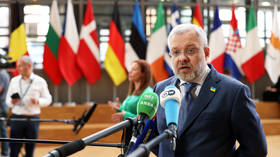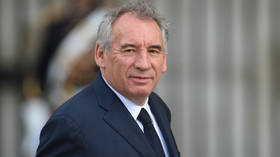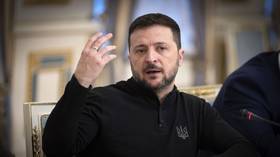Ukraine to block Russian gas transit to EU

Ukraine will stop the flow of Russian natural gas via its transit network on January 1, Energy Minister German Galushchenko has confirmed.
A key gas transit agreement between Moscow and Kiev is due to expire on December 31, and the Ukrainian leadership has repeatedly warned that it has no plans to extend it.
Several EU countries continue to rely on Russian gas, despite the sharp drop in supplies due to sanctions on Moscow and a push by Brussels to sever energy ties with Russia.
Ukraine has made preparations to shut off the gas, Galushchenko told the German-Ukrainian Business Forum in Berlin on Wednesday.
“Our position is completely open. We are preparing for zero transit from January 1. And we have been [preparing] for a long time. This year alone we conducted several stress tests for our gas system to see how it will function with zero transit,” Galushchenko said, as quoted by the Ukrinform news agency.
The transit agreement between Ukraine’s state energy firm Naftogaz and Russia’s energy giant Gazprom was signed in 2019. Naftogaz praised the deal at the time as ensuring security on the domestic gas market. It also revealed that Gazprom had paid nearly $3 billion for the transit service, thus ensuring that the Ukrainian system would operate without a loss over the following five years.
Ukraine’s transit network is connected to the pipeline systems of Moldova, Romania, Poland, Hungary and Slovakia. The EU still receives around 5% of its gas from Russia via Ukraine, according to the latest data.
The Naftogaz transit system and the European arm of TurkStream are the only two remaining conduits for piped Russian gas to reach central and southern Europe. The TurkStream gas pipeline runs from Russia to Türkiye via the Black Sea, and then continues to the border with EU member Greece.
Russia has said it is ready to continue deliveries beyond 2024. Gazprom CEO Aleksey Miller warned in October that the EU would be committing “energy suicide” by shunning Russian gas. The bloc’s policies will result in further deindustrialization, increased volatility on the gas market, and may lead to a new gas price shock and supply disruptions, Miller predicted.
Similar concerns have been voiced by Hungary and Slovakia, the two EU nations most reliant on Russian gas. Budapest continues to receive more than a half of the gas it consumes from Russia under a 15-year contract signed with Gazprom in 2021.
An increased reliance on TurkStream and replacing Russian gas with supplies from Azerbaijan for transit to the EU through Ukraine have been named as possible solutions.












